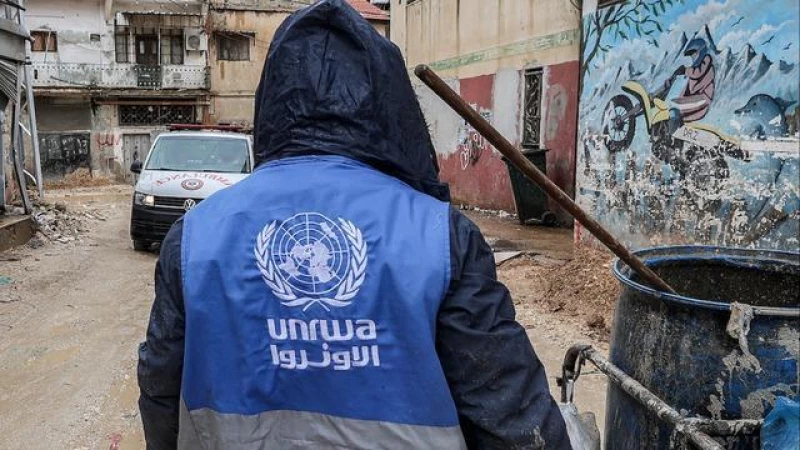The recent agreement on a substantial appropriations bill reached between Congress and the White House will result in a prohibition on all direct U.S. funding for the primary humanitarian organization operating in Gaza, the United Nations Relief and Works Agency for Palestine Refugees, until March 2025, as confirmed by three sources familiar with the negotiations.
Although the White House expressed general support for the deal reached with Congress on Tuesday, it did not mention the reduction in aid, with President Biden committing to immediate signing if approved.
UNRWA, responsible for offering education, healthcare, and social services in the West Bank, Jordan, Lebanon, and Syria to an estimated six million Palestinian refugees, has warned that a halt in aid would lead to "a significant gap" in the agency's funding.
"This action will hinder the efforts to aid the starving population in Gaza and potentially contribute to further destabilization in the region," the agency stated on Wednesday.
UNRWA Aid Faces Uncertain Future Amid Allegations
Advocates for continuing aid have argued that the cutoff is unconscionable at a time when famine in Gaza is imminent. In January, the Biden administration said it was temporarily pausing new funding to UNRWA pending a U.N. investigation into Israel's claims that 12 agency employees participated in the deadly Oct. 7 terror attack in Israel that killed at least 1,200 people. The agency says it employs over 30,000 people. Following Israel's public disclosure, the U.N. terminated ten of those employees, announced two others had died, and launched an investigation.
Before the U.S. pause in funding, the State Department had already provided $121 million to UNRWA this year, spokesperson Matthew Miller said in January. Historically, the full year amount is between $300 and $400 million a year. In 2018, then-President Donald Trump cut all U.S. funding to UNRWA, calling it "irredeemably flawed," but Mr. Biden restored support in 2021.
U.S. intelligence found the Israeli allegations to be credible, but did not conduct an independent analysis, relying instead on an evaluation of the intelligence provided by Israel. The current Biden administration pause has no end date pending the outcome of the U.N. review and reevaluation of all UNRWA employees. Now, this congressional deal in the so-called "minibus" will put a statutory prohibition on funding, thus tying the hands of the administration.
The U.S. has historically been the largest donor to UNRWA, which is the agency with the greatest infrastructure for distribution of aid within the 25-mile Gaza Strip. On Sunday, Democratic Sen. Chris Van Hollen of Maryland warned on "Face the Nation" that a cut off would have dire consequences.
In a recent statement, Senator Van Hollen emphasized the importance of not cutting off funding for UNRWA and Gaza, highlighting the severe consequences that would result from such actions. "If you cut off funding for UNRWA and Gaza entirely, it means more people will starve, more people won't get the medical assistance they need. And so it would be a huge mistake to cut them off," Van Hollen said.
He also delved into the political motivations behind such potential cuts, pointing out that Israeli Prime Minister Benyamin Netanyahu and his right-wing government have long sought to dismantle UNRWA. "Netanyahu has wanted to get rid of UNRWA because he has seen them as a means to continue the hopes of the Palestinian people for a homeland of their own," Van Hollen explained. "And this has been his primary objective, stopping a two-state solution."
Adding to the conversation, on Wednesday, Saudi Arabia announced a significant contribution of $40 million to the UNRWA, following a visit by Secretary of State Antony Blinken.
"Witnessing an increase in the effects of starvation, doctors and medical staff report a heartbreaking reality of newborn babies dying due to being severely underweight," stated Dr. Margaret Harris from the U.N. World Health Organization on Tuesday.
Secretary of State Blinken is set to visit Israel on Friday, with the State Department confirming discussions on "international efforts to significantly increase and maintain the provision of humanitarian aid to civilians facing food shortages."
In a speech at a Washington think tank in February, former U.S. Ambassador David Satterfield, now the Biden administration's special envoy for humanitarian affairs in the Middle East, addressed an Israeli Defense Forces attack on a police unit in Gaza that was safeguarding U.N. aid convoys. He expressed concerns that the strike was hindering efforts to safeguard and distribute aid.
The U.S. military has initiated airdrops of food and is currently constructing a floating dock three miles away from the coast of Gaza to enhance aid delivery. A U.S. Navy representative mentioned that this operation will involve 1,000 troops and is expected to be operational within 60 days. As U.S. forces are not permitted in Gaza, the official stated that discussions are ongoing with other partners to determine the aid distribution process and the security arrangements for the trucks entering the region.







